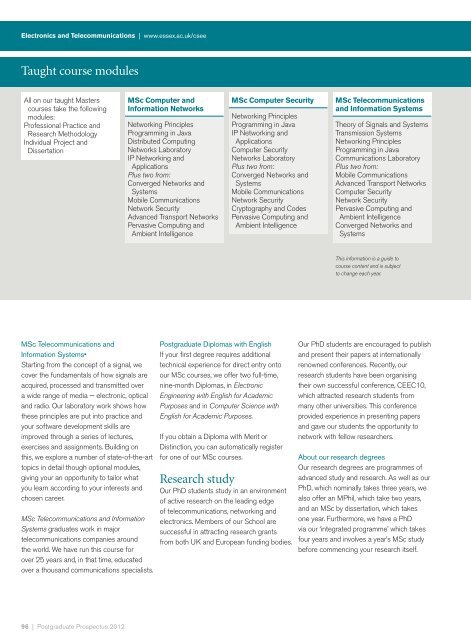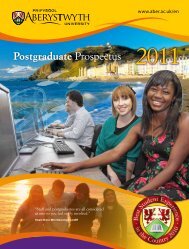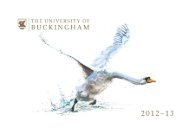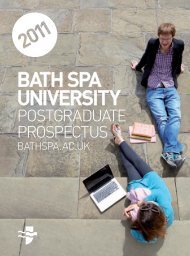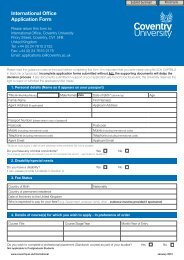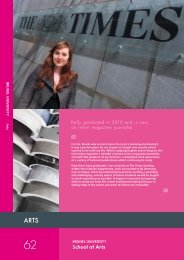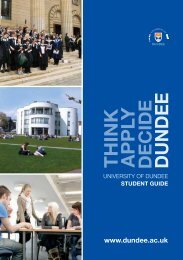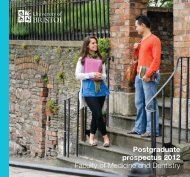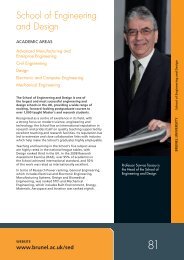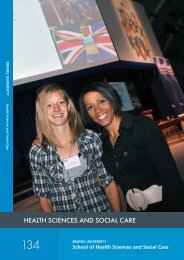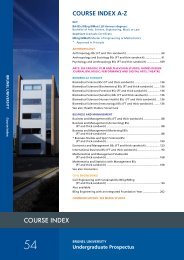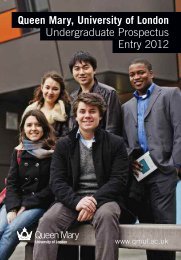Postgraduate Prospectus
Postgraduate Prospectus
Postgraduate Prospectus
Create successful ePaper yourself
Turn your PDF publications into a flip-book with our unique Google optimized e-Paper software.
Electronics and Telecommunications | www.essex.ac.uk/csee<br />
Taught course modules<br />
All on our taught Masters<br />
courses take the following<br />
modules:<br />
Professional Practice and<br />
Research Methodology<br />
Individual Project and<br />
Dissertation<br />
MSc Computer and<br />
Information Networks<br />
Networking Principles<br />
Programming in Java<br />
Distributed Computing<br />
Networks Laboratory<br />
IP Networking and<br />
Applications<br />
Plus two from:<br />
Converged Networks and<br />
Systems<br />
Mobile Communications<br />
Network Security<br />
Advanced Transport Networks<br />
Pervasive Computing and<br />
Ambient Intelligence<br />
MSc Computer Security<br />
Networking Principles<br />
Programming in Java<br />
IP Networking and<br />
Applications<br />
Computer Security<br />
Networks Laboratory<br />
Plus two from:<br />
Converged Networks and<br />
Systems<br />
Mobile Communications<br />
Network Security<br />
Cryptography and Codes<br />
Pervasive Computing and<br />
Ambient Intelligence<br />
MSc Telecommunications<br />
and Information Systems<br />
Theory of Signals and Systems<br />
Transmission Systems<br />
Networking Principles<br />
Programming in Java<br />
Communications Laboratory<br />
Plus two from:<br />
Mobile Communications<br />
Advanced Transport Networks<br />
Computer Security<br />
Network Security<br />
Pervasive Computing and<br />
Ambient Intelligence<br />
Converged Networks and<br />
Systems<br />
This information is a guide to<br />
course content and is subject<br />
to change each year.<br />
MSc Telecommunications and<br />
Information Systems•<br />
Starting from the concept of a signal, we<br />
cover the fundamentals of how signals are<br />
acquired, processed and transmitted over<br />
a wide range of media — electronic, optical<br />
and radio. Our laboratory work shows how<br />
these principles are put into practice and<br />
your software development skills are<br />
improved through a series of lectures,<br />
exercises and assignments. Building on<br />
this, we explore a number of state-of-the-art<br />
topics in detail though optional modules,<br />
giving your an opportunity to tailor what<br />
you learn according to your interests and<br />
chosen career.<br />
MSc Telecommunications and Information<br />
Systems graduates work in major<br />
telecommunications companies around<br />
the world. We have run this course for<br />
over 25 years and, in that time, educated<br />
over a thousand communications specialists.<br />
<strong>Postgraduate</strong> Diplomas with English<br />
If your first degree requires additional<br />
technical experience for direct entry onto<br />
our MSc courses, we offer two full-time,<br />
nine-month Diplomas, in Electronic<br />
Engineering with English for Academic<br />
Purposes and in Computer Science with<br />
English for Academic Purposes.<br />
If you obtain a Diploma with Merit or<br />
Distinction, you can automatically register<br />
for one of our MSc courses.<br />
Research study<br />
Our PhD students study in an environment<br />
of active research on the leading edge<br />
of telecommunications, networking and<br />
electronics. Members of our School are<br />
successful in attracting research grants<br />
from both UK and European funding bodies.<br />
Our PhD students are encouraged to publish<br />
and present their papers at internationally<br />
renowned conferences. Recently, our<br />
research students have been organising<br />
their own successful conference, CEEC10,<br />
which attracted research students from<br />
many other universities. This conference<br />
provided experience in presenting papers<br />
and gave our students the opportunity to<br />
network with fellow researchers.<br />
About our research degrees<br />
Our research degrees are programmes of<br />
advanced study and research. As well as our<br />
PhD, which nominally takes three years, we<br />
also offer an MPhil, which take two years,<br />
and an MSc by dissertation, which takes<br />
one year. Furthermore, we have a PhD<br />
via our ‘integrated programme’ which takes<br />
four years and involves a year’s MSc study<br />
before commencing your research itself.<br />
96 | <strong>Postgraduate</strong> <strong>Prospectus</strong> 2012


